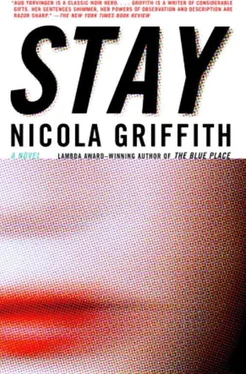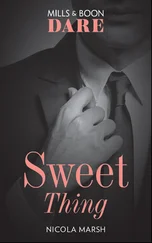“—y por eso la Virgen María fue una reina que vivía en una catedral. Ella fue la reina de cielo, y ella fue linda, con una vestimenta azul junto con diamantes en el dobladillo—”
And so the Virgin Mary was a queen who lived in a cathedral. She was the queen of heaven, and she was pretty, with a blue dress that had diamonds on the hem.
I moved quietly until I could see Button sitting with legs splayed before him, playing with something on the floor. The words meant nothing to him; perhaps he found the rhythm soothing. Luz’s eyes seemed far away, but every now and again she glanced at the boy to make sure he was close by.
“It’s a horse!” Button said, holding up what looked like an ancient threaded bolt.
“Yes,” Luz said in English, and patted him on the head. He went back to playing. She resumed her tale. “Y la virgen reina escucha en caso que rezas. Y cuando mueras vas a su palacio en cielo, que tiene tantos colores lindas y lo huele a… a flores. Y cirios se quemarsen en grutes, y huelen bien también.”
And the virgin queen listens if you pray. And when you die you go to her palace in heaven, which is such pretty colors, and smells like flowers. And there are candles in grottoes, and they smell good too.
It was a six- or seven-year-old’s vocabulary, apart from grotto . Her native tongue. I couldn’t understand how she had retained so much. Adeline Carpenter would not approve of the Virgin Mary being called the queen of heaven, nor of any talk of cathedrals and incense and diamonds.
“El palacio es—Button, put that down.” She sounded so much older speaking English. Button had found something on the floor he liked. He stood up and carried it into the closest column of sunlight. It glittered. “That’s very pretty. Let me see.” She held out her hand. He handed it over reluctantly. A piece of old bottle glass. She sighed, just like Adeline. “Glass, Button. Glass. What did Aba tell you about glass? It might hurt you. If you see it on the floor, don’t pick it up.”
“Glass,” he muttered, unconvinced, but then something else caught his eye, and Luz sighed again.
“Fue un relato agradable,” I said—it was a nice story—and her head whipped round. “You don’t need to be afraid.”
“I don’t understand you,” she said in English.
“Yes you do,” I said, still in Spanish. “I won’t tell anyone. I promise. Not even Aba.”
She opened her mouth, then thought better of it and shut it again. Her eyes narrowed. I’d seen that look on a hundred suspects’ faces: I would get nothing from her.
She was still studying me. “You talk different when no one else is around.”
Careless again. The child was smart; pointless trying to lie to her now. “So do you.”
“Why?”
“Why do you?”
I watched her work out that we both had things to hide. She decided she wanted to keep it that way. “Button!” she called. “How about we go indoors for some milk?”
“Milk?”
“Milk,” she said firmly, with a look at me. I was briefly tempted to wring her neck.
“But I want to stay out here!” His face began to crumple. “Want to stay here!”
The next step would be a full-blown tantrum. I knew when I was beaten; there were other ways to get the information.
Jud and Adeline found me sitting on the front step. I stood, drained the last of the coffee, and handed the mug to Adeline. It would be washed and free of fingerprints in minutes. “Perfect timing,” I said. I put my gloves back on.
“Thank you again,” she said. “The gas station’s just two miles north on 10, then it’ll be a four-, five-mile drive back to the truck.”
Jud said nothing at all.
“Shall we?” I gestured at the truck. He nodded.
He sat as before, though this time his hands rested on dark blue denim, and his shoes were sturdy work boots. Perhaps it was my imagination but he seemed a little less stiff.
At the gas station, the attendant seemed to know who Jud was and filled a cheap plastic gas can without comment. I went in and bought myself coffee in a go cup. Jud settled his bill in cash. He counted his change so carefully that I felt guilty about the ten dollars’ worth of gas I’d siphoned off earlier. I shook my head as we walked separately back to the truck. These people were profiting from the abuse of a young child. I wasn’t here to feel sorry for them.
We drove to the stranded pickup without exchanging a word. He climbed out, then leaned forward to speak through the open window. “Wife tells me you’ve been sick.”
“Yes.”
“You’ll be in our prayers.” And he nodded once again, and walked away.
I parked in what was by now the familiar off-road spot behind the rise and took my mat, field glasses, receiver, and go cup to the top of the hill. No movement outside. I extended the receiver’s aerial, plugged in the headphones, and put them on. I had to take my gloves off for fine-tuning the receiver, but then I had it: running water, dishes banging, a drawer opening and shutting. From only three or four hundred yards, there was little distortion. I made a slow sweep with the field glasses. Inside the house a door opened, then closed. Then nothing.
I sipped at the coffee. All I had achieved with my visit so far was the discovery that the situation was complicated. I wondered what Tammy was doing, whether she had called Dornan yet, and what would happen then: to her, to Dornan. To me.
Adeline started to hum. It wasn’t a hymn but an old show tune. Fringed buckskin, white teeth, blond hair… and then I had it: Doris Day in Calamity Jane , singing about the windy city. When her husband wasn’t around, did Adeline dream of being transformed by a big-city suitor?
After a while I heard Jud’s pickup. I wondered what had taken him so long. Maybe he’d been giving thanks for the gas. He drove round the back of the house. Two minutes later, the back door slammed.
“Sit,” came Adeline’s voice, loud and tinny from the receiver. “We’ll eat.”
Scraping of a chair, chink of cutlery on crockery. Scrape of another chair. Moment’s silence. Then, “Dear Lord, we’re thankful for this food. Amen.” Jud’s voice. “Amen,” Adeline’s voice. Food sounds: lighter tink of spoons on bowls.
Adeline’s voice: “Truck all right?”
Pause, while I imagined Jud nodding. “Drove her to the gas station, had John put her up on the blocks. No leak as I could see.” Eating noises. Pause. “Gas come to near nineteen dollars.” Audible sigh: Adeline. “Children fine?” Jud asked.
“Out back. Right as rain.” Which was more than Adeline sounded. “Jud?” Eating noises. “Jud, why haven’t we heard?”
“Couldn’t say.”
“We should have heard by now. How can we manage without that money?”
“We’ll hear soon enough.” Definite tones in his voice of I-don’t-want-to-think-about-it-right-now.
“Maybe I shouldn’t have written to Miz Goulay, maybe it’ll make him mad. But that check should’ve come a week ago, more. He’s never missed before. We need that money.”
Chair scraping. “Tractor needs work,” Jud said. The door closed behind him. Adeline sighed and started collecting the dishes, then stopped, and it took me a moment to identify the strange sounds: she was crying.
I had finished the coffee and refilled the cup with lukewarm tea from my flask when I saw movement in my peripheral vision: a car moving down the road to the Carpenters’ house. I put down the cup and focused the field glasses. My adrenal system switched from standby to power mode. A dark gray Maxima, a man driving and a woman in the back. Not the configuration for a social call.
The Maxima parked three or four yards from the Carpenters’ front door, and the man took just long enough to remove the keys and open his door to tell me the car was probably a rental. He climbed out, looked around. Sloppy training. He should have looked around before he parked, and again before he left the car. He should have familiarized himself with his vehicle. He should have looked up. He closed his door, checked around one more time before opening the woman’s door.
Читать дальше












